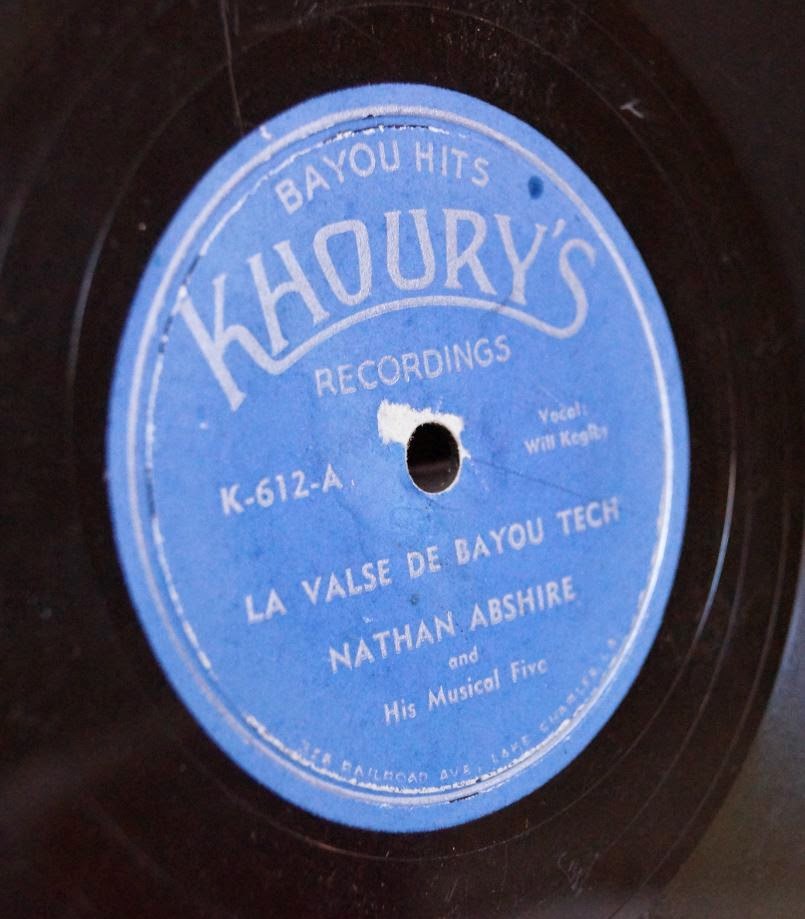Amédé Ardoin and Dennis McGee, one a black Creole, the other a white Cajun, braved a nation intent on segregation to perform and record together openly.3 During a New Orleans session for Brunswick in 1930, they laid down several tracks including one about a town north of Lafayette called "Valse Des Opelousas" (#559). It would be one of the last Cajun recording sessions before Cajun recording ceased due to the Depression.
Shown here is a re-issue in which Brunswick entitled the batch of releases "Collectors Series". According to record producer Chris King, it’s possible most of Ardoin’s songs are about one person: the girl to whom he was betrothed, or about to be betrothed—the most profound romantic fascination of his young life. Theirs was a shotgun-to-the-temple, unbearable, drive-it-like-it’s-stolen love, uncompromising and insane. Something went wrong. They never married. According to “Valse Des Opelousas,” she left, crying. “Oh, tite fille, si tu m’aimerais comme t’as voulu me dire / Tu te sentirais pas déçue pour ça ils sont après te dire,” Ardoin sings after her. Oh, little girl, if you loved me as much as you said, you wouldn’t feel so disappointed by what they’re telling you.
 |
Daily Advertiser
May 17, 1947 |
O, jolie, comment je vas faire, tu m'abandonnes,
O, 'tit monde, qui je vas faire, 'tite fille.
O, holie, comment je vas faire, Madeleine,
Moi, j'ai connu mais ton papa et ta maman,
Ouais, ça veut pas catin, ça veut pas moi je vas,
Ouais, donc, chez toi, je vas faire plaisir à tes parents.
O, 'tite fille, si tu m'aimerais, comme t'as voulu me dire.
Si ça serais pas dessus les rapportages ils sont après te dire.
O, catin, tu devrais toi, te rappeller, jolie,
Quand t'étais c'ez toi, tu vas quitter moi, tout seul,
O, 'tite fille, t'as passé dimanche après midid,
T'as passé me donner ta main, t'as partie en pleurant.
O, tite fille, mon je t'ai dit je m'aurais jamais marié,
O, c'est toi la porte de voir ça t'avais fait avec moi.

King explains:
In my understanding of that culture, in that particular time period, because it was so intensely Catholic and superstitious, you got married, and you didn’t get a new wife or husband until the other one died. The same stigma was attached to betrothal.
Ardoin’s romantic outlook, from then on, was grim. The way King figured it,
There was a woman for you, and if you didn’t get that one, well, you know, you were just fucked.
 |
| Amede Ardoin |
Because he couldn’t have her, Ardoin sang to her, over and over again. I imagine her as the kind of beautiful that makes your stomach hurt: sweet-faced and long-legged and a little mischievous around the eyes, too smart for her own good. King likes to think that Ardoin sang to her with the hope that she’d eventually hear his prayers and adjurations—that he believed he could, in effect, sing her back to his side. He was clearly ready to die trying. “Oh, tite fille, moi, j’ai dit je m’aurais jamais marié / Oh, c’est rapport de voir ça t’as fait avec moi,” he sighs at the end of “Valse Des Opelousas,” his body gutted, his voice tired. Oh, little girl, I said I would never marry. Oh, it’s because of seeing what you’ve done to me.
Oh, pretty girl, what am I going to do, you're leaving me.
Oh, my little world, what can I do, little girl.
Oh, pretty girl, what am I going to do, Madeline,
I knew your father and your mother,
Yes, they didn't want, little doll, didn't want me to go,
Yes, to your house, so I'll please your parents.
Oh, little girl, if you had loved me like you wanted to tell me,
If it just hadn't been for all those stories they were telling you.
Oh, little doll, you must remember, pretty one,
When you were at your house, you were going to leave me all alone.
Oh, little girl, you passed by on Sunday,
You passed to give me your hand, but you left crying.
Oh, little girl, I told you I'd never marry,
Oh, you're the reason, seeing what you've done to me.
After moving to Eddie Shuler's label, Iry used the tune for his "La Valse de Bayou Chene" in 1952. It's influences can be found in Aldus Roger's "Duson Waltz" and Austin Pitre's "St. Landry Waltz".
- http://www.oxfordamerican.org/magazine/item/244-amede-ardoin-accordion-virtuoso
- I'm Never Comin' Back: The Roots of Zydeco - Amédé Ardoin. Liner notes.
- http://nodepression.com/article/hearth-music-visit-94-year-old-cajun-fiddler-milton-vanicor
- NOTE: Cajun Country, Vol. 2 (JSP, 2005) listing is mis-titled
Find:
Pioneers of the Cajun Accordion (Arhoolie, 1989)
I'm Never Comin' Back: The Roots of Zydeco (Arhoolie, 1995)
Cajun Country, Vol. 2, More Hits from the Swamp (JSP, 2005)
Mama, I'll Be Long Gone : The Complete Recordings Of Amede Ardoin (Tompkins Square, 2011)


















